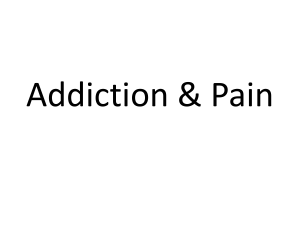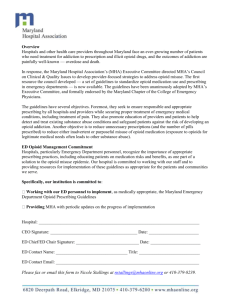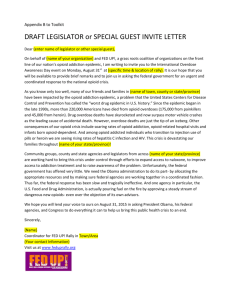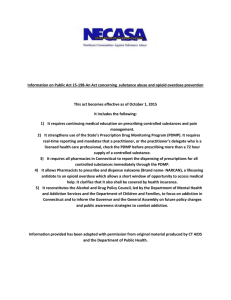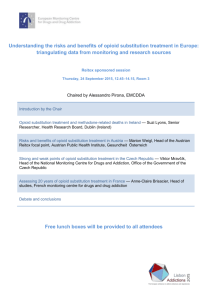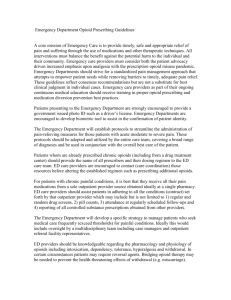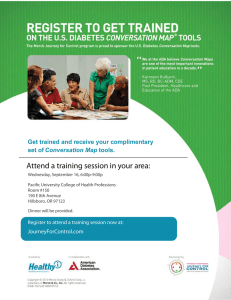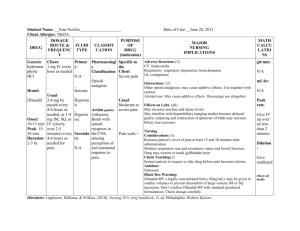The Opioid Puzzle:
advertisement
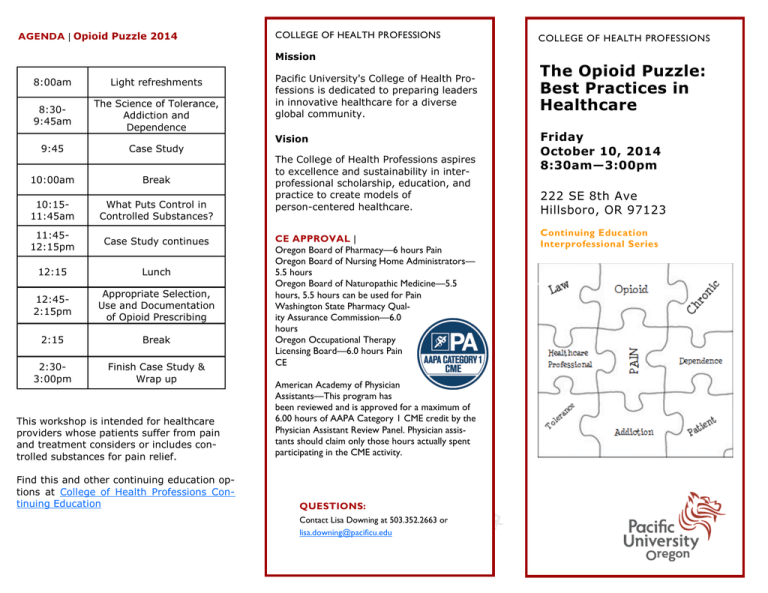
AGENDA | Opioid Puzzle 2014 COLLEGE OF HEALTH PROFESSIONS Mission 8:00am Light refreshments 8:309:45am The Science of Tolerance, Addiction and Dependence 9:45 Case Study 10:00am Break 10:1511:45am What Puts Control in Controlled Substances? 11:4512:15pm Case Study continues 12:15 Lunch 12:452:15pm Appropriate Selection, Use and Documentation of Opioid Prescribing 2:15 Break 2:303:00pm Finish Case Study & Wrap up This workshop is intended for healthcare providers whose patients suffer from pain and treatment considers or includes controlled substances for pain relief. Find this and other continuing education options at College of Health Professions Continuing Education Pacific University's College of Health Professions is dedicated to preparing leaders in innovative healthcare for a diverse global community. Vision The College of Health Professions aspires to excellence and sustainability in interprofessional scholarship, education, and practice to create models of person-centered healthcare. CE APPROVAL | Oregon Board of Pharmacy—6 hours Pain Oregon Board of Nursing Home Administrators— 5.5 hours Oregon Board of Naturopathic Medicine—5.5 hours, 5.5 hours can be used for Pain Washington State Pharmacy Quality Assurance Commission—6.0 hours Oregon Occupational Therapy Licensing Board—6.0 hours Pain CE American Academy of Physician Assistants—This program has been reviewed and is approved for a maximum of 6.00 hours of AAPA Category 1 CME credit by the Physician Assistant Review Panel. Physician assistants should claim only those hours actually spent participating in the CME activity. CONTINUING EDUCATION COLLEGE OF HEALTH PROFESSIONS QUESTIONS: 222 SE 8TH Ave Contact Lisa Downing at 503.352.2663 or Hillsboro, OR 97123 lisa.downing@pacificu.edu lisa.downing@pacificu.edu COLLEGE OF HEALTH PROFESSIONS The Opioid Puzzle: Best Practices in Healthcare Friday October 10, 2014 8:30am—3:00pm 222 SE 8th Ave Hillsboro, OR 97123 Continuing Education Interprofessional Series COURSE DESCRIPTION | LEARNING OBJECTIVES | REGISTRATION | Opioids With the current medical and legislative controversies around use of opioids in chronic pain patients, many healthcare professionals puzzle to balance appropriately treating pain and increasing quality of life, versus overmedicating or inappropriately medicating patients with disastrous consequences. This seminar clarifies misconceptions around the mechanisms and signs of tolerance, addiction, and dependence, reviews current laws and regulations regarding controlled substance prescribing including the Prescription Drug Monitoring Program and deliberates on how to make the decision to treat with an opioid. After attending this seminar, participants should be able to better understand the mechanism by which opioid addiction occurs, the objective data of opioid use and law in the Pacific Northwest, how to protect their practice while improving patient care, and should be able to inform their clinical decision making by an increased understanding of risk factors and protocols for opioid treatment. Identify the physiological basis and presentation of toler- Pay by Credit Card: ONLINE REGISTRATION Recognize general opioid mechanism of action, and pre- Pay by Check: Mail this form and payment to: COURSE PRESENTERS | Amber Buhler, PhD Associate Professor ance and dependence versus addiction phenomena Mike Millard, RPh, MS Assistant Dean for Clinical Services, Assistant Professor Andrew Mendenhall, MD Medical Director of Hazelden Beaverton dictable effects on development of tolerance and dependence Assess pharmacokinetic factors underlying varied addiction risk potential of commonly prescribed opioids Evaluate symptoms of tolerance and dependence versus addiction in a case study Identify the current laws and regulations surrounding opioid prescribing in Oregon and Washington Locate resources you might use to safely support an opioid prescription Recognize the impact current laws and regulations have had on the prevalence of under-medication Consider the impact these regulations have on the use of methadone in the Pacific Northwest Evaluate the effect these regulations have on curbing opioid abuse Contemplate the increase of heroin use rates in the Pacific Northwest Evaluate personal biases related to prescribing or dispensing of opioids Recognize patient right-to-treatment of chronic pain Demonstrate familiarity with practice guidelines and proper documentation of opioid treatment Evaluate factors which influence the clinical decision to prescribe an opioid or not Assess risks and benefits of opioid prescribing in a case study Address pain treatment in a patient you suspect of abusing or diverting opioids Pacific University College of Health Professions Continuing Education 222 SE 8th Ave, #570 Hillsboro, OR 97123 Space is limited. Registration is first come, first serve. Full Name_____________________________________ School + Year__________________________________ E-mail________________________________________ Preceptor Site: _________________________________ Daytime Telephone______________________________ Address_______________________________________ City/ST/Zip___________________________________ Dietary restrictions or Special Accommodations: ____________ __________________________________________________ NOTE: Electronic handouts will be available prior to the conference. Check the box below to obtain a printed copy day of conference. $5 fee applies. ___ Add $5 for a printed copy of the handouts TOTAL FEES (USD) $ ___________ Register by September 24 Register after September 24 Alumni $75.00 $100.00 Pacific Preceptor $90.00 $125.00 $100.00 $150.00 Non Alumni Refunds less $25 administration fee will be processed up to 10 days prior to the event. Refunds will not be issued within 10 days of the start of the course. COLLEGE OF HEALTH PROFESSIONS | Become an Exhibitor or Sponsor CONTINUING EDUCATION SERIES Questions? Lisa Downing or call 503.352.2663 Breast Cancer Standard and CAM—09/12/14 Sim Lab Medical Emergencies—09/26/14 Build Your Own Practice—Practical Tools Series
